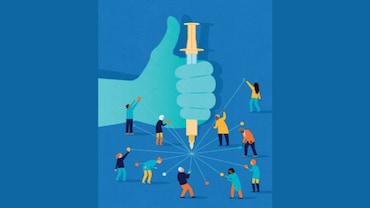- HOME
- /
- Health & Wellness
- /
- Health
- /
Fight Off Viruses
How to strengthen your immune system
 All photos: Shutterstock
All photos: Shutterstock
One thing that the COVID-19 pandemic has made clear is that some people who get the virus don’t suffer much, while others become very sick indeed. And while the elderly have been particularly hard hit, some do survive—even centenarians. As for younger people, whose immune systems are supposed to be more robust, many have nevertheless died of it. So, what factors give some people a stronger immune system than others, regardless of age? What does it mean if, for example, your partner or child gets sick, and you don’t—or vice versa?
We know that our immune-system function slowly declines with age. Just like when you see a photo of yourself from 10 years ago versus one taken this afternoon, you see changes in your face, skin and hair colour. It takes time. “Same process with your immune system,” says Dr Insoo Kang, associate professor of medicine and director of allergy and immunology at the Yale School of Medicine.
Kang has been studying human ageing for 20 years. “Immune cells, especially CD8+ T-cells [a type of white blood cell], change with ageing. We see fewer of those CD8+ T-cells, which are needed to recognize newly emerging microorganisms like the COVID-19 virus. It happens to everyone on some level, just not at the same rate.”
The difference in rate of decline between individuals is one of science’s big mysteries. The immune system is complex, but most of us understand the basics: Our body detects an intruder—a virus, bacterium, parasite or foreign object—and produces white blood cells to combat the problem. How many of these cells you produce when you’re, say, 73 versus when you were 45 is the million-dollar question. And it’s at the heart of the COVID-19 pandemic as well: How does a 104-year-old man survive when people half his age, or younger, do not?
Fortunately, we won’t always be in a pandemic. But we can use this one to gain an understanding of how our immune system changes with age—and how it might be possible to slow the decline and raise our immune re-serves for the next time we get sick.
Immunity and Ageing
Our body simply doesn’t produce as many immune cells as we get older, says Dr Atul Butte, distinguished professor of epidemiology, biostatistics, and paediatrics at the University of California, San Francisco. “And no one really knows why.”
Butte worked with a research team on an extensive review of 242 immunity studies that revealed patterns in how our immune systems change as we get older. Certain key immune cells—B-cells (white blood cells that make antibodies to fight infection) and T-cells (white blood cells that attack viruses)—become fewer in number with age. For example, we possess two broad categories of T-cells: ‘memory’ cells that have en-countered a certain pathogen and ‘remember’ how to fight it; and ‘naive’ cells, like the CD8+ type mentioned earlier, that have yet to fight anything. “We’ve seen especially that the number of naive T-cells seems to be lower as we age,” Butte says.
So let’s say COVID-19 shows up. Nothing we’ve seen before as humans matches this one, so we have no memory T-cells to mobilize (although new research suggests some of us may have formed some defences if we’ve had brushes with previous coronaviruses). The naive cells have to take on the fight, and older folks have fewer of those to fight with. That makes most of these people more vulnerable, but not all, because not everyone’s immune system declines in the same way. For example, another factor Butte observed in his study review: Some healthy older people had little or no decline in T-cells. Some had as many as younger people, and women seemed to have higher amounts in general as they aged.

No one really knows just what a healthy amount of B- and T-cells is. Says Butte: “If you want to have a test for your haemoglobin, they know what a normal range is. If you want your iron levels tested, they know what the normal range is. We have no idea what the normal level is for these cells. We don’t even measure them in a regular blood test.”
The reasons these key cells decline over time could be manifold. Is it genetic? Lifestyle? “We know genetics plays a part,” Butte says. “But it’s debatable how big of a part compared with environment and lifestyle.”
Lifestyle factors like poor sleep, chronic stress and weight gain often cause chronic low-grade inflammation, as can systemic issues like autoimmune diseases and decreased liver and kidney function. This inflammation degrades the immune system because it causes it to operate abnormally by constantly firing. That accelerates the ageing process on a cellular level. It can lead to heart disease, type 2 diabetes, Alzheimer’s disease and more, compromising your immune system without you even knowing it.
“Most systems in our body are tightly regulated,” says Dr Sean Xiao Leng, a geriatrician and professor at the Geriatric School of Medicine at Johns Hopkins University. “The immune system is no exception, which is why this dysregulation is so dangerous.”
Saving your Immune System
You can’t do anything about your genetic makeup, but luckily, many factors that positively affect your immune system are within your control. Take them seriously, Leng urges. While you may not be able to stop decreased immunity as you age, any slowdown you can produce means a higher immune reserve at any given time. That’s critical when it comes to infections.
When we talk about vulnerability in older adults, says Leng, there are two important parts: “One is incidence—whether you get the infection or not. But the other part is severity. Even if you don’t have the incidence outcome you want, having a stronger immune function may determine how badly you’ll be infected.” In other words, every ounce of prevention helps, including the following:
Movement Regular workouts boost immune function and lower inflammation. A 2019 study in Nature Reviews Immunology noted that skeletal muscle is a “major immune regulatory organ” that generates anti-inflammatory and immunoprotective proteins called myokines. A 2018 study found that higher-intensity workouts may blunt immune-system decline in older adults. “Exercise strengthens the body and may be the most important lifestyle intervention you can add,” Kang says.
Self-knowledge Butte suggests that people gain a better understanding of where their health is right now. For example, those with asthma may want to start measuring their peak airflow to know what their normal lung function is. “The more we can use digital devices and tools, the more we’ll understand,” he says. “If something changes, you’re not just going to the doctor and saying, ‘I’m having trouble breathing.’ You can say, ‘My airflow has dropped eight per cent’.” Staying on top of whatever chronic conditions you have will allow you to spot declines quickly, so you and your doctor can decide on a better course of therapy.
Nutrition Eating right and avoiding obesity, which is deadly when it comes to inflammation, are common sense. But research also reveals specific nutritional effects on immune function in older adults. A study reviewed in the journal Nutrients in 2018 showed that basic nutrients like vitamins A, C, D, E and the B vitamins, along with folic acid, iron, selenium and zinc, are essential for ‘immunocompetence’, with deficiencies causing lower T-cell production and an inability to resolve inflammation.

Strive for balance, Kang says: “Eat not just vegetables but also good proteins and fibre.” The latter is important because it feeds the good bacteria in your gut and can help lower inflammation. “We have a lot of immune cells in the gut that help regulate health. Dietary fibre may have more than the single effect of making the bowel move.”
Calm Research has shown that unregulated stress can accelerate immune-system decline. It comes down to a chronic immune response to whatever’s stressing you, with the resulting rise in inflammation. Self-care in this area becomes critical— from anti-stress activities (meditation, mindfulness, exercise) to asking for help in unresolved stressful situations (work, money, caregiving). People don’t talk enough about the effect of stress on immunity because it’s not as tangible as factors such as hours of exercise or how many packs of cigarettes per day you smoke, Leng notes.

Vaccines Age takes its toll on vaccine effectiveness as well as immunity. Vaccines are designed to provoke the production of antigens—the influenza vaccine is made of influenza cells—but our ageing immune reserve doesn’t respond as robustly as it did in our earlier years. None of that should make you lazy about vaccines. “It’s true they be-come less effective as people get older,” Kang says. “But even if you do get infected, the disease will be less severe. People should get whatever vaccines their doctors recommend based on age and underlying medical conditions.”
Medications Certain prescription medications may inhibit your immune system. For example, oral and inhaled corticosteroids (common for arthritis, allergies, asthma and inflammatory bowel disease) may raise your risk of fungal infections. The same is true for TNF (tumour necrosis factor) inhibitors that treat autoimmune conditions like rheumatoid arthritis and psoriasis. “Even antibiotics could kill gut bacteria and trigger some kinds of infection,” Kang says. If you’re on any ongoing medications, talk to your doctor about possible immune-system side effects and how to address them.
COVID-19 lessons
Aside from a deeply ingrained knowledge of handwashing and how far away two metres is, the COVID-19 pandemic will, in the end, teach us more about our health vulnerabilities—individually, and as an ageing population.
Butte believes it will usher in a new era in immunity research. “We’re going to learn a lot in a hurry.” Leng foresees a large push into learning more about ageing and immunity by studying the older adult population and unlocking the unknown mechanisms in the immune response. He’s already part of a massive National Institutes of Health initiative into geriatric science involving hundreds of researchers.
“The traditional medical model focuses on individual disease,” he says. “But we’ll try to see if we can find an underlying mechanism in immunity, something upstream in the process. Then we can do a wider search rather than chase after individual diseases. If we can do that, the older population will handle all immune challenges better.”
From AARP (4 April 2020), Copyright ©2020 by AARP, aarp.com






